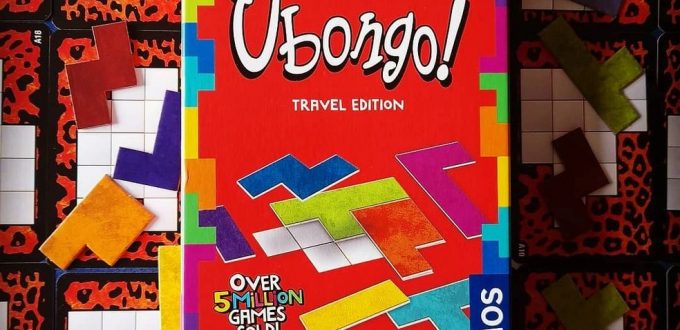Publisher: KOSMOS GAMES
Designer: Grzegorz Rejchtman
Artist: Nicolas Neubauer
Release date: Coming Soon
1-4 Players
Age 8+
15/20 mins
Favouritefoe score: 7.5/10
Click below to watch my Ubongo Rapid Review Video!
Ubongo, Ubongo, they play it in the Congo……ok, so I am borrowing slightly from that well known, day-glow fruit flavoured drink we all hyped ourselves up on as kids. And I don’t actually know what games people play in the jungle. But I do know this little puzzle game is fun, and no e-numbers or alligators in sight!
In case you haven’t played any others in the KOSMOS range (which I understand is going through a bit of a re-launch at the moment), Ubongo means “brains” in Swahili. And, just like its bigger siblings, you will need to set your mind to the tasks at hand if you are going to win!
Essentially, this is a scaled down version of the original Ubongo, and is a series of quick-fire spatial puzzles.
Using a double-sided deck of cards, you are tasked with filling in your randomly selected grid using the 8 small polyomino tiles at your disposal. A new puzzle card is distributed to each player every round with eight rounds making up a full game. But, each grid only has room for 3 (Set A) or 4 (Set B) tiles in total. So it is down to you to tessellate and test until you can fit them in exactly without overlapping or leaving any individual squares exposed.
The puzzles themselves aren’t that tricky – our almost 6 year old was able to work most of them out on his own through an impressively committed exercise in trial and error. The fun factor in Ubongo travel therefore comes not so much from the tile placement, but rather the sudden and unexpected time pressure.
You see, whilst all players are simultaneously figuring out how their tiles fit into their unique grids, the gameplay is relatively serene. As soon as one player has solved their own puzzle, however, they start counting down from 20 to 0. And at the point the time runs out, if the other players haven’t been able to complete their grid, they score a bit fat zero that round. For a little puzzle requiring only 3 or 4 tiles, the rate at which your mind suddenly empties is surprising. And, believe me, brain freeze sets in even quicker if, like mine, your opponents are shouting and banging the table in time to the seconds ticking away!
I would mention that that the component quality isn’t the greatest– the thin cardboard tiles can start to look a little ragged around the edges pretty quickly, and they are very small. But this game can be bought for less than £10 and is intended to accompany you on your travels, not inhabit your gaming table on a daily basis.
As such, I think it does a pretty good job as a game for on-the-go which doesn’t take up a lot of luggage space or weight, and can be played in less time than it takes to do a lap of Duty-Free. Furthermore, although the 8 tiles are different colours, each shape is individual (and the cards are labelled A/B), so the game is not dependent upon being able to differentiate between the various shades which is great for those who suffer with CVD.
Overall, I think Ubongo Travel is a light, fun, game. Perfect for a handbag, a suitcase, or even a back pocket!
If you like Queendomino, try Ubongo 3D, Ubongo Junior, or Project L (unplayed)
[please note that a copy of this game was kindly provided by the publisher for the purposes of this review but any opinions expressed are my own]





